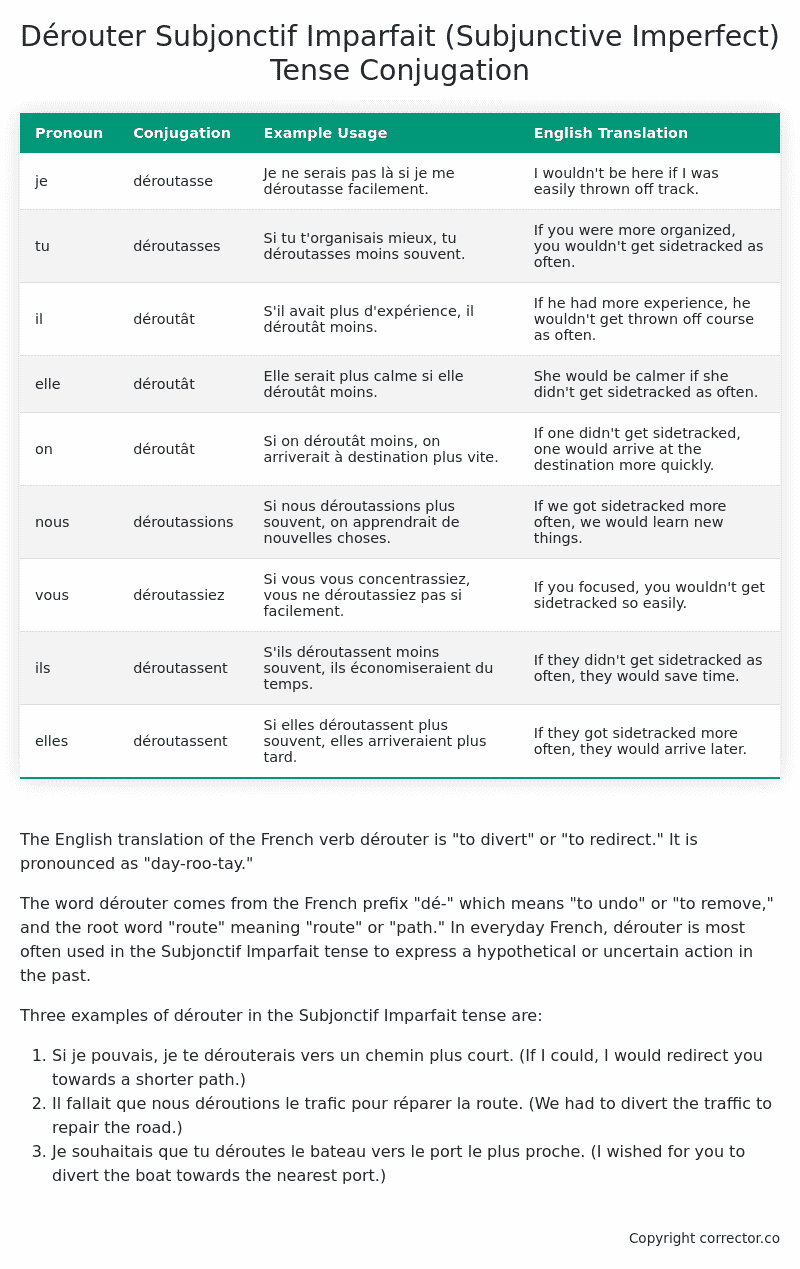Subjonctif Imparfait (Subjunctive Imperfect) Tense Conjugation of the French Verb dérouter
Introduction to the verb dérouter
The English translation of the French verb dérouter is “to divert” or “to redirect.” It is pronounced as “day-roo-tay.”
The word dérouter comes from the French prefix “dé-” which means “to undo” or “to remove,” and the root word “route” meaning “route” or “path.” In everyday French, dérouter is most often used in the Subjonctif Imparfait tense to express a hypothetical or uncertain action in the past.
Three examples of dérouter in the Subjonctif Imparfait tense are:
- Si je pouvais, je te dérouterais vers un chemin plus court. (If I could, I would redirect you towards a shorter path.)
- Il fallait que nous déroutions le trafic pour réparer la route. (We had to divert the traffic to repair the road.)
- Je souhaitais que tu déroutes le bateau vers le port le plus proche. (I wished for you to divert the boat towards the nearest port.)
Table of the Subjonctif Imparfait (Subjunctive Imperfect) Tense Conjugation of dérouter
| Pronoun | Conjugation | Example Usage | English Translation |
|---|---|---|---|
| je | déroutasse | Je ne serais pas là si je me déroutasse facilement. | I wouldn’t be here if I was easily thrown off track. |
| tu | déroutasses | Si tu t’organisais mieux, tu déroutasses moins souvent. | If you were more organized, you wouldn’t get sidetracked as often. |
| il | déroutât | S’il avait plus d’expérience, il déroutât moins. | If he had more experience, he wouldn’t get thrown off course as often. |
| elle | déroutât | Elle serait plus calme si elle déroutât moins. | She would be calmer if she didn’t get sidetracked as often. |
| on | déroutât | Si on déroutât moins, on arriverait à destination plus vite. | If one didn’t get sidetracked, one would arrive at the destination more quickly. |
| nous | déroutassions | Si nous déroutassions plus souvent, on apprendrait de nouvelles choses. | If we got sidetracked more often, we would learn new things. |
| vous | déroutassiez | Si vous vous concentrassiez, vous ne déroutassiez pas si facilement. | If you focused, you wouldn’t get sidetracked so easily. |
| ils | déroutassent | S’ils déroutassent moins souvent, ils économiseraient du temps. | If they didn’t get sidetracked as often, they would save time. |
| elles | déroutassent | Si elles déroutassent plus souvent, elles arriveraient plus tard. | If they got sidetracked more often, they would arrive later. |
Other Conjugations for Dérouter.
Le Present (Present Tense) Conjugation of the French Verb dérouter
Imparfait (Imperfect) Tense Conjugation of the French Verb dérouter
Passé Simple (Simple Past) Tense Conjugation of the French Verb dérouter
Passé Composé (Present Perfect) Tense Conjugation of the French Verb dérouter
Futur Simple (Simple Future) Tense Conjugation of the French Verb dérouter
Futur Proche (Near Future) Tense Conjugation of the French Verb dérouter
Plus-que-parfait (Pluperfect) Tense Conjugation of the French Verb dérouter
Passé Antérieur (Past Anterior) Tense Conjugation of the French Verb dérouter
Futur Antérieur (Future Anterior) Tense Conjugation of the French Verb dérouter
Subjonctif Présent (Subjunctive Present) Tense Conjugation of the French Verb dérouter
Subjonctif Passé (Subjunctive Past) Tense Conjugation of the French Verb dérouter
Subjonctif Imparfait (Subjunctive Imperfect) Tense Conjugation of the French Verb dérouter (this article)
Subjonctif Plus-que-parfait (Subjunctive Pluperfect) Tense Conjugation of the French Verb dérouter
Conditionnel Présent (Conditional Present) Tense Conjugation of the French Verb dérouter
Conditionnel Passé (Conditional Past) Tense Conjugation of the French Verb dérouter
L’impératif Présent (Imperative Present) Tense Conjugation of the French Verb dérouter
L’infinitif Présent (Infinitive Present) Tense Conjugation of the French Verb dérouter
Struggling with French verbs or the language in general? Why not use our free French Grammar Checker – no registration required!
Get a FREE Download Study Sheet of this Conjugation 🔥
Simply right click the image below, click “save image” and get your free reference for the dérouter Subjonctif Imparfait tense conjugation!

Dérouter – About the French Subjonctif Imparfait (Subjunctive Imperfect) Tense
Formation
Common Everyday Usage Patterns
Interactions with Other Tenses
Subjonctif Présent
Indicatif Passé Composé
Conditional
Conditional Perfect
Summary
I hope you enjoyed this article on the verb dérouter. Still in a learning mood? Check out another TOTALLY random French verb conjugation!


